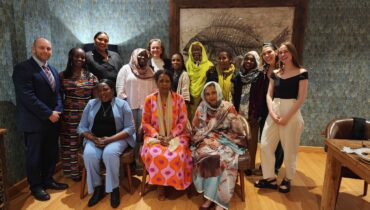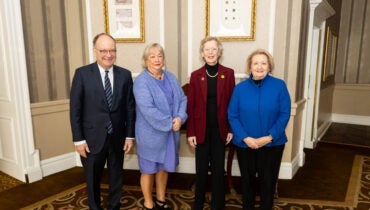Margot Wallström, the Swedish Minister for Foreign Affairs and Deputy Prime Minister, spoke at Georgetown University on March 31 about the feminist foreign policy that has been at the core of Swedish foreign policy since Wallström took the helm of Sweden’s Ministry of Foreign Affairs in 2014. Wallström’s remarks centered on the importance of ensuring that women have a voice at the table and are active participants in decision-making processes in order to ensure peace and security writ large.
Wallström spoke about current conflicts and security threats around the world, emphasizing the devastating impacts of insecurity in places like Burundi, Yemen, Afghanistan, Iraq, Syria, and Ukraine. She argued, “It is clear that the international order has not succeeded in its core task of ensuring peace and security for all.” She pushed for a global commitment to addressing the root causes of conflict, and investing in sustainable development and peacebuilding, especially through convenings such as the World Humanitarian Summit. She called for strengthening regional organizations and international coordination, positing that “security is built together with others.”
This emphasis on interdependence is directly connected to the core values of Sweden’s feminist foreign policy – inclusive cooperation creates more innovative solutions. This means incorporating the perspectives of women and men from different ethnic, religious, age, and regional groups. Sweden’s Ministry of Foreign Affairs describes the goals underlying a feminist foreign policy: “Equality between women and men is a fundamental aim of Swedish foreign policy. Ensuring that women and girls can enjoy their fundamental human rights is both an obligation within the framework of our international commitments, and a prerequisite for reaching Sweden’s broader foreign policy goals on peace, and security and sustainable development.”
Wallström centers her policies on the three Rs: rights, representation, and resources.
Speaking at Helsinki University in March 2015, Wallström laid out her vision for women’s rights, drawing a line between protection and progress. “Rights – the simple fact is that human rights are also women’s rights. Here, two fundamental tracks must be followed when pursuing a feminist foreign policy. Firstly, there are areas where we must aim for prohibition, such as gender-based discrimination, forced marriages and female genital mutilation. Secondly, there are areas where the aim is progress, for example equal rights to inheritance and access to education and health, including sexual and reproductive health and rights. These areas are key to women’s empowerment.”
Speaking Thursday, Wallström emphasized the importance of women’s representation at the decision-making table, arguing that it should be second nature for policymakers to ask if women are being represented and whether women are allocated the same resources as men.
However, identifying rights and representation as priorities is meaningless without the third R: shifting resources to conflict prevention and peacebuilding with a gender lens. Wallström argued that providing resources for humanitarian aid and peace processes is not a humanitarian problem, but a political problem. She posited that the inclusion of women “transcends the divide between hard and soft security and enables sustainable peacebuilding.” Wallström remarked that political will must be mobilized to reallocate resources and commit to long-term peacebuilding and development.
Feminist international relations scholars have identified the gendered structures and impacts of the international order and imagined a shift away from patriarchal and male-dominated systems of control toward inclusive, transparent, and empowering modes of governance, and Sweden’s feminist foreign policy is a powerful statement about moving these concepts from theory to reality. This approach to foreign policy shows confidence in the translation of core ideas in feminist international relations theory into practical, effective policy. As Wallström argued, “The promotion of gender equality is not only a matter of women’s rights, but a matter of ensuring peace and security for all.”
Advancing a truly feminist model of foreign policy has serious ramifications for the operations of states and the international community; breaking down male-dominated systems and opening the door for women around the world will fundamentally shift the structure and help women to rewrite these systems in ways that serve both women and men.
Sweden is not the only country that places an emphasis on ensuring women’s rights and access to decision-making processes. Gender mainstreaming in development, humanitarian aid, healthcare, and conflict resolution practices has grown in significance as recognition of women’s skills and knowledge has also grown. While feminist principles play a serious role in the foreign policy of many countries, Sweden and Wallström make a powerful statement by explicitly describing the country’s foreign policy approach, first and foremost, as feminist. Emphasizing inclusivity, protection of rights, and equality between women and men is key to building more peaceful and stable societies. Wallström argues that the inclusion of women as active participants and agents of change will help the international community “more effectively end conflicts and ensure that peace is sustainable and inclusive.”
See the video and read the transcript of the event at Georgetown University.
About the Author
Briana Mawby is a 2015-2016 Hillary Rodham Clinton Research Fellow with the Georgetown Institute for Women, Peace and Security. She previously served as a research consultant for the World Bank Global Knowledge Partnership on Migration and Development Thematic Working Group on Environmental Change and Migration. Ms. Mawby has also worked at the Georgetown Center for Social Justice Research, Teaching and Service and the Center for Media and Public Affairs. She has advanced French language skills and intermediate Spanish language skills. She is a graduate of Georgetown University with an M.A. in conflict resolution, and a specialization in post-conflict reconstruction and peacebuilding in East and Central Africa. She received a certificate in Refugees and Humanitarian Crises from the Institute for the Study of International Migration. She completed her B.A. in international affairs at the George Washington University in Washington, D.C.


